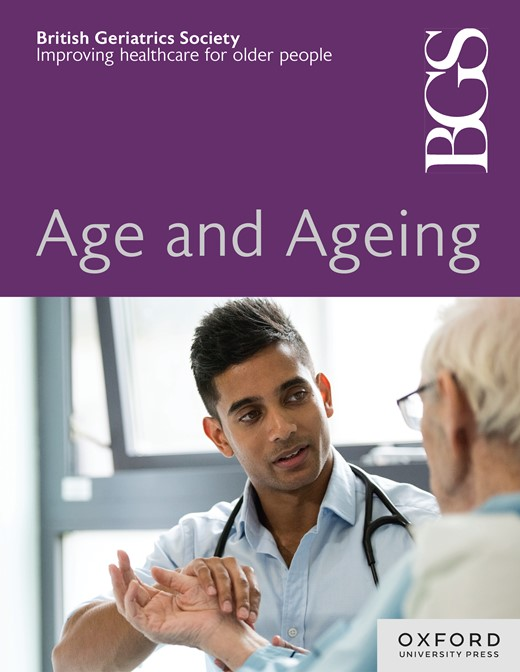3138 Older patients' and caregivers' perceptions of and attitudes to de-prescribing in Saudi Arabia: a cross-sectional study
IF 6
2区 医学
Q1 GERIATRICS & GERONTOLOGY
引用次数: 0
Abstract
Introduction Development of effective deprescribing interventions requires thorough understanding of attitudes of relevant stakeholders involved in the medication decision-making process. This study aimed to examine older patients; and caregivers; perspectives on deprescribing in Saudi Arabian hospitals and explored factors influencing their attitudes. Method A survey study was conducted using the Revised Patients’ Attitudes Toward Deprescribing (rPATD) questionnaire (Arabic version), which was administered to older patients and caregivers recruited from two hospitals in southern Saudi Arabia through convenience sampling. Participants provided written informed consent and ethical approval was obtained. Descriptive analyses (frequencies and proportions) summarised beliefs about medication inappropriateness, burden, discontinuation concerns, involvement and two global questions. Bivariate analyses examined links between participant characteristics and questionnaire responses. Results Questionnaires were completed by 253 participants (126 older patients and 127 caregivers; response rate 87%). Most patients were aged 65–69 years (53.2%), married (65.1%), and taking 5–8 medications (57.2%). Almost two-thirds (65.9%) were satisfied with medications, and 88.1% were willing to have them deprescribed. Patients taking 5–8 medications showed significantly greater willingness for deprescribing compared to those taking ≥9 medications (p < 0.001). Married patients were more involved in medication decision-making than non-married patients (p < 0.05). Most caregivers were aged 25–34 years (38.5%) and married (75%). Their care recipients were primarily ≥80 years, with 67.7% taking 5–8 medications. Most caregivers (60%) were satisfied with care recipients; medications, and 82.6% were willing to have these deprescribed. Caregivers of care recipients taking ≥9 medications reported greater burden associated with managing medications (p < 0.001). Conclusion Characteristics such as the number of prescribed medications influenced patients’ and caregivers’ perceptions of medication burden and willingness to have medications deprescribed, while marital status influenced involvement in medication decision-making among patients. These insights may be used to help guide hospital deprescribing interventions.3138 .沙特阿拉伯老年患者和护理人员对取消处方的看法和态度:一项横断面研究
开发有效的处方干预措施需要彻底了解参与药物决策过程的相关利益相关者的态度。这项研究的目的是检查老年患者;护理人员;对沙特阿拉伯医院处方处方的看法,并探讨影响其态度的因素。方法采用沙特阿拉伯南部两家医院的老年患者和护理人员进行方便抽样调查,采用阿拉伯语版《患者对处方减少的态度》问卷进行调查研究。参与者提供书面知情同意并获得伦理批准。描述性分析(频率和比例)总结了对药物不适当、负担、停药问题、参与和两个全球性问题的看法。双变量分析检验了参与者特征和问卷回答之间的联系。结果共完成问卷253份,其中老年患者126份,护理人员127份;应答率87%)。患者以65 ~ 69岁(53.2%)、已婚(65.1%)、服用5 ~ 8种药物(57.2%)居多。近三分之二(65.9%)的人对药物治疗感到满意,88.1%的人愿意开处方。服用5-8种药物的患者比服用≥9种药物的患者更愿意去处方化(p <;0.001)。已婚患者比未婚患者更多地参与药物决策(p <;0.05)。大多数照顾者年龄在25-34岁(38.5%),已婚(75%)。他们的护理对象主要年龄≥80岁,67.7%的患者服用5-8种药物。大多数照护者(60%)对接受照护者感到满意;82.6%的人愿意接受药物治疗。服用≥9种药物的护理对象的护理人员报告了与药物管理相关的更大负担(p <;0.001)。结论处方药物数量等特征影响患者和护理人员对药物负担的认知和解除处方的意愿,而婚姻状况影响患者参与药物决策。这些见解可用于帮助指导医院开处方干预措施。
本文章由计算机程序翻译,如有差异,请以英文原文为准。
求助全文
约1分钟内获得全文
求助全文
来源期刊

Age and ageing
医学-老年医学
CiteScore
9.20
自引率
6.00%
发文量
796
审稿时长
4-8 weeks
期刊介绍:
Age and Ageing is an international journal publishing refereed original articles and commissioned reviews on geriatric medicine and gerontology. Its range includes research on ageing and clinical, epidemiological, and psychological aspects of later life.
 求助内容:
求助内容: 应助结果提醒方式:
应助结果提醒方式:


